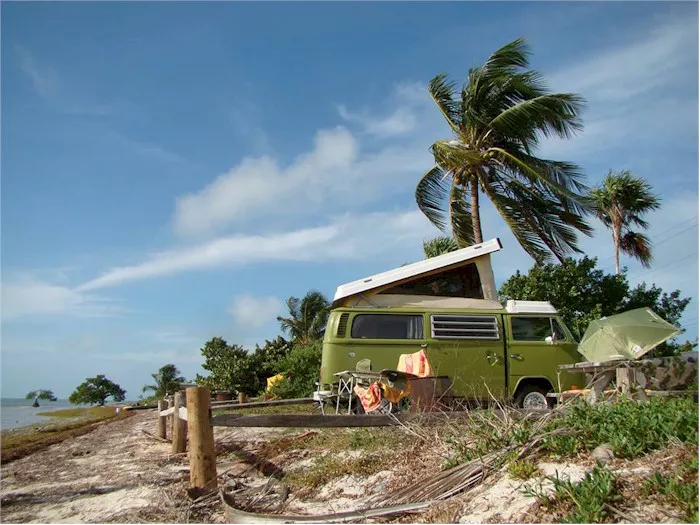Camping in Florida: What You Need to Know
Rules of the Road
If you’re planning a camping vacation in Florida, it’s essential to understand the state’s traffic laws, particularly those that affect campers and RVs.
- Florida mandates that all trailers weighing over 3,000 pounds must have brakes on all wheels, as outlined in Florida Motor Vehicles Code Section 316.261.
- All passengers in a motor vehicle must wear safety belts or use child restraint devices, irrespective of seating position. Florida’s “click it, or ticket” law empowers law enforcement to stop vehicles for this violation.
- The “Move Over Act,” enacted in 2002, requires drivers to change lanes or slow down (by at least 20 miles below the posted speed limit) when approaching stopped emergency vehicles on highways.
Bugs and Critters
While camping in Florida, be prepared for mosquitoes, which can carry diseases such as encephalitis and West Nile Virus. Here are some prevention tips:
- Wear long-sleeved clothing to protect your skin.
- Apply mosquito repellent containing DEET at a range of concentrations; however, for children, a 15-percent concentration is recommended. Additionally, consider all-natural alternatives like Crocodile!® or products like Avon’s Skin-So-Soft for short-term relief.
- Stay indoors during peak mosquito activity times, which are early morning, dusk, and evening.
- Eliminate standing water around your campsite to help control mosquito populations.
Other insects to look out for include ants, noseeums (sand fleas), and wasps. Having hydrocortisone cream available in your first aid kit can help relieve insect bite irritation. Be sure to carry an EpiPen if you have known allergies to stings.
The wildlife that might be seen includes raccoons, snakes, tortoises, alligators, and an array of large cats. While they may seem adorable, it’s important to remember that they are wild animals and should not be approached.
Fishing Licenses
As of August 1, 2009, those fishing in Florida’s saltwater must adhere to the new shoreline fishing license requirement. Residents (except those over 65 or under 16) need either a $9 shoreline fishing license or a $17 regular saltwater license. However, there are no non-resident shoreline licenses available, with fees set at $17 for three days, $30 for seven days, or $47 for the entire year.
It’s also important to note that various exemptions apply; for instance, individuals over 65, children under 16, and active-duty military personnel fishing while on leave do not require a license. Licensed fishing piers automatically cover everyone fishing from them.
Weather
Florida’s weather can be unpredictable, particularly during summer thunderstorms. Here are some tips to prepare for various conditions:
- Hurricane season lasts from June 1 to November 30, peaking between August and October. Make reservations that allow for changes or cancellations without penalties.
- To minimize lightning risks, adhere to the 30/30 rule: if the time between lightning strikes and thunder is less than 30 seconds, seek shelter immediately.
- Stay away from water, beaches, and trees during thunderstorms, as they can conduct electricity.
- Florida’s summer heat can be intense; it’s vital to stay hydrated and take breaks in shaded areas.
- Be aware that freezing temperatures can occur in Central and North Florida during December to February.




